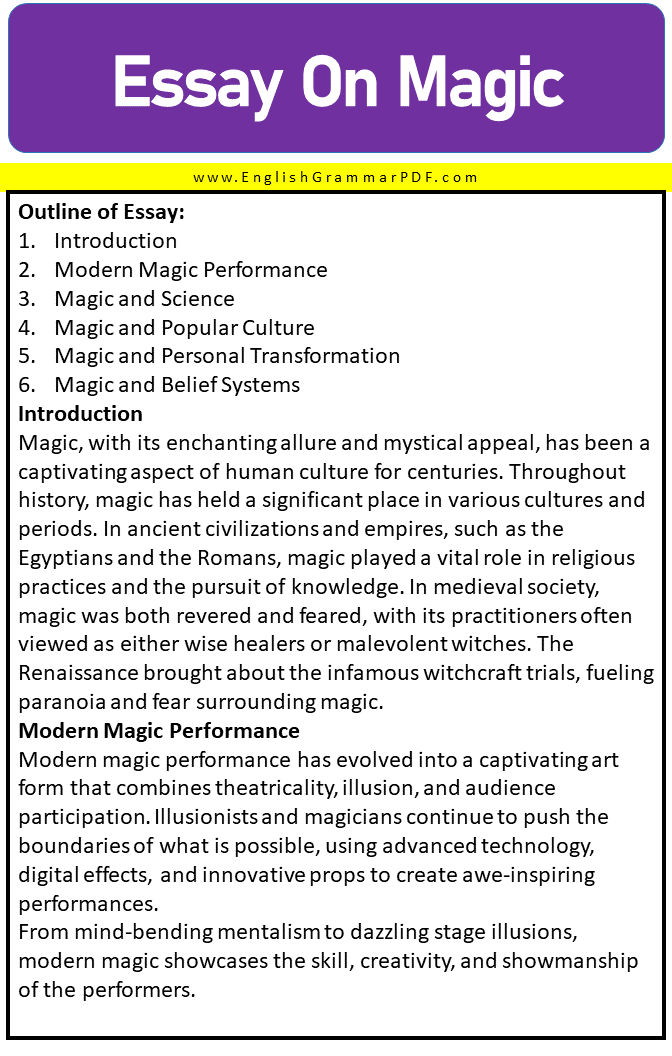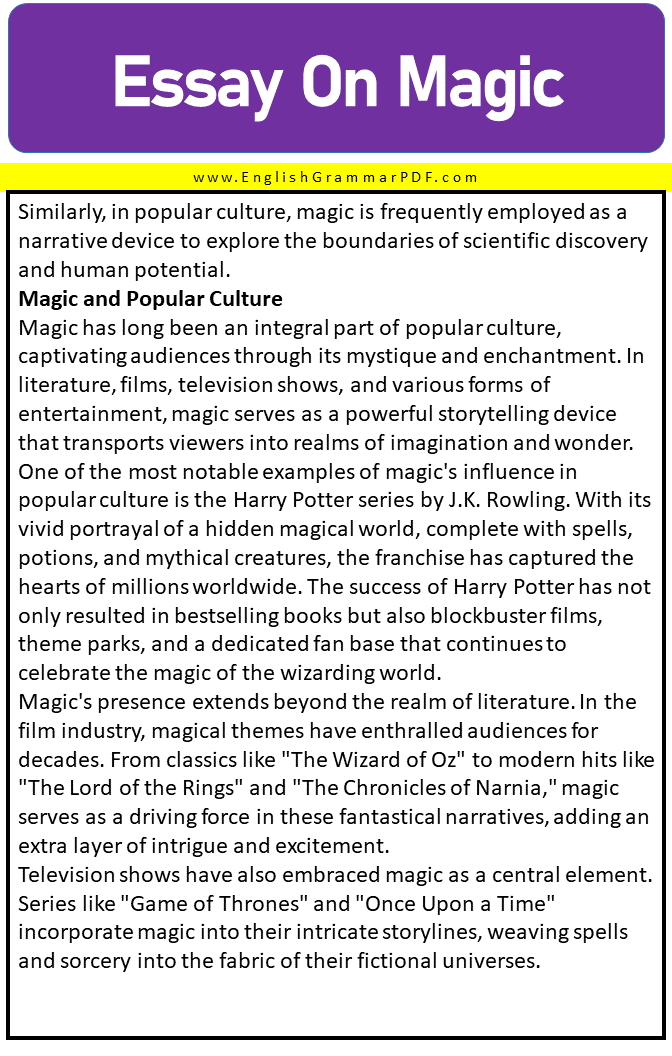Essay On Magic
Outline of Essay:
- Introduction
- Modern Magic Performance
- Magic and Science
- Magic and Popular Culture
- Magic and Personal Transformation
- Magic and Belief Systems
Introduction
Magic, with its enchanting allure and mystical appeal, has been a captivating aspect of human culture for centuries. Throughout history, magic has held a significant place in various cultures and periods. In ancient civilizations and empires, such as the Egyptians and the Romans, magic played a vital role in religious practices and the pursuit of knowledge. In medieval society, magic was both revered and feared, with its practitioners often viewed as either wise healers or malevolent witches. The Renaissance brought about the infamous witchcraft trials, fueling paranoia and fear surrounding magic.
Modern Magic Performance
Modern magic performance has evolved into a captivating art form that combines theatricality, illusion, and audience participation. Illusionists and magicians continue to push the boundaries of what is possible, using advanced technology, digital effects, and innovative props to create awe-inspiring performances.
From mind-bending mentalism to dazzling stage illusions, modern magic showcases the skill, creativity, and showmanship of the performers. The psychology behind magic tricks adds another layer of intrigue, as the audience is left wondering how the seemingly impossible is achieved. Modern magic performances captivate audiences worldwide, transporting them to a realm of wonder and leaving them spellbound.
Magic and Science
Magic and science, two seemingly contrasting realms, have a fascinating relationship that has evolved. While science seeks to explain the natural world through observation, experimentation, and rationality, magic delves into the realm of the mystical, the unexplained, and the seemingly impossible. Historically, magic and science were often at odds, with scientists seeking to debunk magical claims and magicians using scientific principles to create illusions.
However, the boundaries between magic and science have blurred in various ways. In the past, disciplines such as alchemy and astrology were seen as both scientific and magical pursuits. Alchemists aimed to transform base metals into gold and sought the elixir of life, while astrologers studied celestial bodies to predict human destinies. These pursuits incorporated elements of both science and magic, as practitioners combined observation and experimentation with mystical beliefs and symbolism.
Furthermore, magic has served as a metaphor in scientific literature and popular culture. Scientists often use magical concepts to explain complex phenomena that defy conventional understanding. Metaphors such as “quantum entanglement” and “spooky action at a distance” borrow from magical imagery to describe the bizarre behavior of particles in quantum physics. Similarly, in popular culture, magic is frequently employed as a narrative device to explore the boundaries of scientific discovery and human potential.
Magic and Popular Culture
Magic has long been an integral part of popular culture, captivating audiences through its mystique and enchantment. In literature, films, television shows, and various forms of entertainment, magic serves as a powerful storytelling device that transports viewers into realms of imagination and wonder.
One of the most notable examples of magic’s influence in popular culture is the Harry Potter series by J.K. Rowling. With its vivid portrayal of a hidden magical world, complete with spells, potions, and mythical creatures, the franchise has captured the hearts of millions worldwide. The success of Harry Potter has not only resulted in bestselling books but also blockbuster films, theme parks, and a dedicated fan base that continues to celebrate the magic of the wizarding world.
Magic’s presence extends beyond the realm of literature. In the film industry, magical themes have enthralled audiences for decades. From classics like “The Wizard of Oz” to modern hits like “The Lord of the Rings” and “The Chronicles of Narnia,” magic serves as a driving force in these fantastical narratives, adding an extra layer of intrigue and excitement.
Television shows have also embraced magic as a central element. Series like “Game of Thrones” and “Once Upon a Time” incorporate magic into their intricate storylines, weaving spells and sorcery into the fabric of their fictional universes. Additionally, magical characters and creatures have become iconic in popular culture, such as the witches and wizards in “Bewitched” and the vampires with supernatural abilities in “The Vampire Diaries.”
Magic’s influence extends beyond traditional media. Video games, virtual reality experiences, and tabletop role-playing games often incorporate magical elements, allowing players to immerse themselves in worlds filled with spells, enchanted artifacts, and epic quests.
Magic and Personal Transformation
Beyond its entertainment value, magic holds a profound significance in personal transformation and spiritual practices. Various belief systems and spiritual paths incorporate magical rituals, ceremonies, and symbolism to facilitate self-development and inner growth. Magic is seen as a tool for manifestation and positive change, allowing individuals to tap into their inner potential and connect with the energies of the universe. However, ethical considerations and potential dangers must be acknowledged, as the pursuit of magic can also lead to exploitation and harm.
Magic and Belief Systems
Magic and belief systems are intricately intertwined, as they both address the fundamental human desire to understand and influence the forces that shape our lives and the world around us. Belief systems, such as religions, spiritual paths, and cultural traditions, often incorporate magical practices as a means of connecting with the supernatural or divine.
In many religious contexts, magic is seen as a form of communication with the divine, enabling individuals to seek guidance, protection, or intervention. Rituals and ceremonies involving magical elements serve as a bridge between the earthly realm and the spiritual realm, allowing believers to tap into the powers beyond their immediate perception.
Magical traditions within different belief systems offer unique approaches to understanding the mysteries of existence. These traditions often provide frameworks for harnessing magical energies, utilizing spells, symbols, or invocations to effect change in the physical or spiritual realms. From the healing rituals of indigenous cultures to the ceremonial magic of Western occultism, these practices reflect the diverse ways in which people have sought to navigate the intricate relationship between themselves, the natural world, and the supernatural.
Magic in belief systems can also serve as a form of cultural and social identity, preserving and reinforcing shared values, customs, and traditions. Through the practice of magic, individuals connect with their heritage and find a sense of belonging within their communities. Additionally, the exchange of magical ideas and practices among different cultures and belief systems, facilitated by globalization, has led to a rich tapestry of magical traditions that continue to evolve and adapt.
While belief systems provide a framework for understanding the world, magic offers a means of personal empowerment and transformation. The belief in and practice of magic can provide individuals with a sense of agency and control over their lives, as they seek to manifest their desires, overcome obstacles, and navigate the complexities of the human experience.
FAQ’s
What is the need for magic?
The need for magic lies in its ability to inspire wonder, ignite the imagination, and provide a sense of enchantment and escapism in our lives.
What is the five magic?
The “five magic” refers to the five basic categories or types of magic often seen in fantasy literature and gaming: elemental magic, healing magic, illusion magic, necromancy (death magic), and telekinesis.
What are the three rules of magic?
The three rules of magic vary depending on the magical system, but a common set of rules includes: Magic has a cost or consequence, Magic must have limits or restrictions, and Magic requires knowledge, skill, or willpower to use effectively.
What is the secret of magic?
The secret of magic lies in the art of illusion and deception. Magicians use sleight of hand, misdirection, and clever techniques to create the illusion of supernatural or impossible feats while keeping the actual methods hidden from the audience.
Download the PDF of the Essay:
Explore More Essays:









